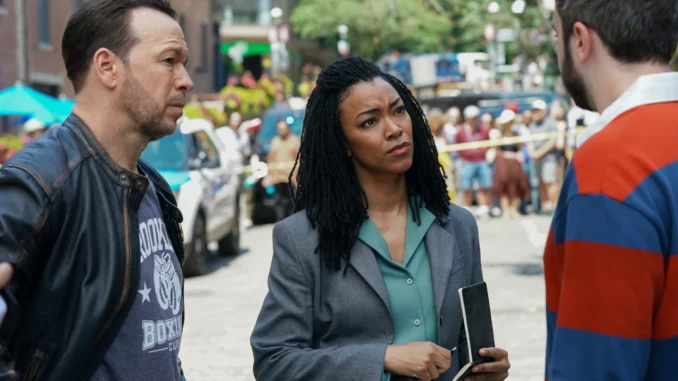
When Blue Bloods ended its remarkable 14-season run, fans around the world thought they had seen the last of the Reagan family’s legacy. The Sunday dinners, the debates about justice and morality, the deep-rooted sense of faith and family—all seemed to have reached a poignant conclusion. But CBS wasn’t done telling this story. With ‘Boston Blue,’ the network has crafted a spinoff that feels less like a reboot and more like a soulful continuation—a new chapter that honors the original while daring to explore uncharted emotional territory.
And at the heart of it all stands Donnie Wahlberg’s Danny Reagan, a man whose loyalty and fire have always defined Blue Bloods. Only this time, he’s far from New York—and far from the comforting embrace of the Reagan family table.
A Fresh Start in a Familiar Spirit
Boston Blue opens with a haunting sense of transition. Danny, still haunted by past losses, relocates to Boston after a personal and professional turning point. It’s both a return to his roots and a journey into unfamiliar ground. Wahlberg, who hails from Boston in real life, gives this move a layer of authenticity that feels deeply personal.
While Blue Bloods was grounded in the traditions of the Reagan dynasty, Boston Blue focuses on what happens when those traditions are stripped away. Danny no longer has his father Frank’s guidance or his siblings to lean on. Instead, he finds himself surrounded by new colleagues—some who admire his New York grit, and others who think his old-school methods have no place in modern policing.
The tone of Boston Blue is grittier, sharper, and more introspective. There are fewer family dinners, but more moments of quiet reflection—of Danny questioning whether his lifelong devotion to justice has cost him too much.
Donnie Wahlberg at His Career Best
Wahlberg delivers one of the most layered performances of his career here. He carries Danny’s weariness like an invisible badge—tired but not broken, skeptical but not cynical. His eyes still burn with that same intensity that defined him in Blue Bloods, but now there’s an added vulnerability, a sense that every choice he makes might carry an emotional price.
What makes his portrayal so magnetic is how grounded it feels. Wahlberg understands Danny better than anyone; after all, he’s played the role for more than a decade. But Boston Blue allows him to peel back layers we’ve never seen before. We witness Danny not as a cop surrounded by family, but as a man learning to stand on his own, rebuilding his sense of purpose in a city that challenges everything he knows.
His return to Boston also feels symbolic—almost like a homecoming for Wahlberg himself. There’s a palpable connection between actor and setting that makes every scene feel raw and lived-in.
New Faces, New Challenges
The supporting cast in Boston Blue is strong and dynamic, representing a mix of seasoned officers and fresh recruits. While CBS has kept many casting details under wraps, the early ensemble suggests a balance between character-driven storytelling and procedural familiarity. There’s a noticeable shift in energy: the camaraderie feels earned, not inherited.
Unlike Blue Bloods, which revolved around family tradition and moral debates, Boston Blue zeroes in on the human cost of law enforcement. Episodes dive into mental health, community tensions, and the difficulty of maintaining compassion in an increasingly polarized world.
One of the standout dynamics is between Danny and his new partner—a detective who challenges his instincts and forces him to reconsider the black-and-white worldview he once lived by. Their relationship quickly becomes one of the emotional anchors of the show, reminiscent of Danny’s bond with Detective Maria Baez, but with a sharper edge and more emotional friction.
Cinematic Tone and Storytelling Evolution
Visually, Boston Blue takes cues from prestige dramas rather than standard police procedurals. The cinematography captures Boston’s rugged charm—its narrow streets, harbor skyline, and gritty neighborhoods—creating a backdrop that feels both intimate and cinematic. The show’s color palette leans darker and cooler than Blue Bloods, mirroring Danny’s inner turmoil and the city’s gray moral landscape.
The writing, led by showrunner Kevin Wade and a new team of Boston-based writers, maintains the moral heart of Blue Bloods while modernizing its structure. Each episode still delivers a compelling case, but the true focus lies in character growth, emotional consequence, and the blurred lines between duty and humanity.
This is Blue Bloods through a more psychological lens—less about family dinners and more about the solitude that follows when the family isn’t there.
Honoring the Past, Forging the Future
Perhaps the most satisfying aspect of Boston Blue is how it pays tribute to Blue Bloods without becoming trapped by it. The series subtly references the Reagan family, from framed photos on Danny’s desk to quiet mentions of his father’s wisdom. But the show never relies on nostalgia alone; it earns its emotional depth through new stories, new faces, and a renewed sense of purpose.
As one character tells Danny early in the season, “You can’t outrun who you are.” That single line captures the spirit of Boston Blue perfectly. This isn’t about escaping the Reagan legacy—it’s about expanding it, proving that family isn’t just the people you eat with every Sunday. It’s the people you choose to stand with when the world turns dark.
Final Verdict
Boston Blue is a bold, emotionally charged continuation of one of TV’s most beloved franchises. It respects what came before while daring to ask harder questions about identity, loyalty, and loss. Donnie Wahlberg commands every frame, reminding us why Danny Reagan remains one of television’s most enduring characters.
It’s not just a spinoff. It’s a rebirth — both for Danny and for the Blue Bloods legacy.
And if the premiere is any indication, Boston Blue isn’t just honoring family tradition… it’s redefining it for a new generation.